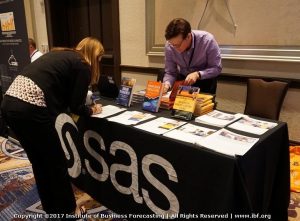Please join me and my colleague Charlie Chase, for the IBF's Predictive Business Analytics Forecasting & Planning Conference in New Orleans (April 23-25).

Charlie and I will be staffing the SAS booth, and available to answer your SAS forecasting questions, or provide a software demonstration. Also, fill out a short questionnaire and select your choice of a free book from the Wiley & SAS Business Series. These titles will be available:
- Demand-Driven Forecasting
- Next Generation Demand Management
- The Business Forecasting Deal
- Business Forecasting: Practical Problems and Solutions
Scheduled Presentations
This conference has an abundance of timely topics. Here are a few early favorites:
- Randy Wilp (Merck) & Tom Dyer (Collaborative Outcomes), "A New Framework to Present Business Intelligence & Insight for Greater Influence." How to present analytically based findings in a way to convince what are frequently non-analytically based management decision makers.
- Luidi Maia (OneSubsea), "Analyzing Your Drivers of Volatility." Demand volatility has a significant influence on how accurately we can forecast. This session reveals how to identify the different sources of volatility, both external and internal, and what you can do about them. [Which reminds me that "Making the data forecastable" is the surest way to get better forecasts!]
- Charlie Chase (SAS), "How to Become an Analytics-Driven Organization." This looks to be a nice complement to the Wilp & Dyer presentation, showing how to build a culture of analytics to drive organizational decision making.
- Mike Guerra (Hershey's), "Using COV Analysis to Slash WMAPE." While Coefficient of Variation has its detractors, and it is an imperfect measure of the "forecastability" of a demand pattern, COV is still a simple and highly useful metric in understanding forecasting performance. Will be interesting to see how Hershey's uses COV analysis to not just understand forecasting performance, but improve it.
- Vivek Sasikumar & Nima Shahbaz (Deepnify), "Deep Learning Analytics and Demand Planning Head to Head." Citing research that claims Artificial Intelligence can reduce forecast errors 30-50%, this presentation examines what alignment will be needed between demand planners and data scientists to actually achieve these kinds of gains.
- Mary Côté (Maximus Canada), "Forecasting Human Capital." I'll be co-presenting with Mary on this, with her providing all the intellectual content. Should be an interesting look at the many similarities (but also differences) between forecasting human resources and cans of soup.
SAS customer Chad Schumacher, Sr. Director of Analytics at Kellogg's, will also be presenting. As will my long-time collaborator, Jonathon Karelse (Factors Group of Nutritional Companies), on multi-variate regression to quantify the impact of promotions.
Early Bird Pricing expires March 16.
